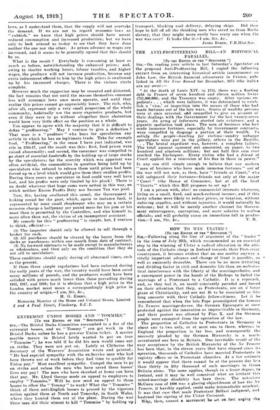THE ANTI-PROFITEERING BILL—AN HISTORICAL PARALLEL.
(To THE EDITOR Of THE " SPECTATOR."1 SIR,—On reading your article in last Saturday's Spectator on the proposed Anti-Profiteering Bill, I copied the following extract from an interesting historical article (anonymous) on John Law, the British financial adventurer in France, pub- lished in All the Year Round for December, 1875 (the italics are my own):— "At the death of Louis XIV. in 1715, there was a floating debt in France of seven hundred and eleven million livres (711,000,000), and the Treasury was empty. After various ex- pedients . . . which were failures, it was determined to estab- lish a 'visa,' or inspection into the means of those who had made fortunes out of the late wars. Scores of wealthy persons were at once arrested, add compelled to give an account of their dealings with the Government for the last twenty-seven years. An army of informers started into existence, and a gigantic spoliation took place. The men of business who had made immense fortunes, especially by Government contracts, were compelled to disgorge a portion of their wealth. To satisfy the people—howling for victims—sundry unhappy speculators were put in the pillory, others in the Bastille. . . . The brutal expedient was, however, a complete failure. The total amount squeezed out amounted, on paper, to two hundred and nineteen millions; but not half this sum ever reached the Exchequer. Every victim who had a friend at Court applied for a remission of his fine to those in power."
Is any one still simple enough to believe that our modern "men of business who have made immense fortunes " out of the war will not now, as then, have " friends at Court," who will safeguard their fortunes—friends not only at the major "Court" (the House of Commons), but at all the local " Courts " which this Bill proposes to set up ?
I am a person with, alas! no commercial interests whatever, living on a small, fixed, and much-reduced income; and if this hasty scheme were likely to reduce prices, or taxation, without reducing supplies, and without injustice, it would naturally be welcome; but it will be merely another channel for Govern- ment extravagance, corruption, and more salaries to useless officials; and will probably cause an immediate fall in produc-


































 Previous page
Previous page